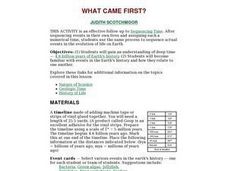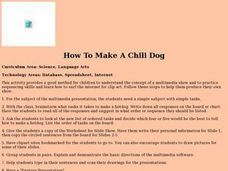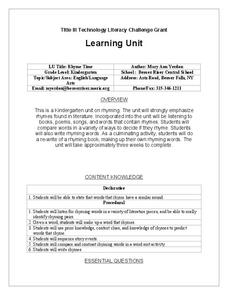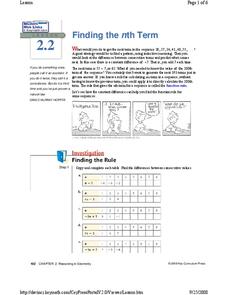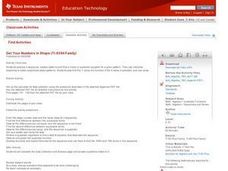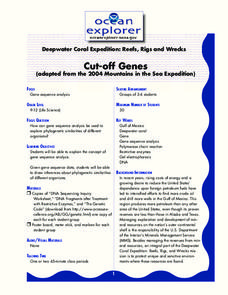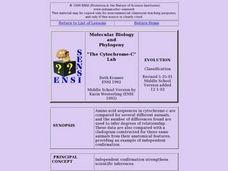Curated OER
Using Plot Elements to Retell a Story
The stories in Sandra Cisneros’s The House on Mango Street form the basis for a lesson on plot elements. The class examines introduction, sequence, problem, rising action, climax, falling action and resolution and identifies these...
Curated OER
Comprehension Questions: The City of Ember, Chapter 20
Comprehension questions for the last chapter of Jeanne DuPrau's book The City of Ember assess factual recall, sequencing skills, and inference about the text. Note: One question about point of view is based on a sentence not related to...
Curated OER
The Dragonslayers, Chapters 9 & 10: Comprehension Quiz
Bruce Coville's fantasy novel The Dragonslayers (chapters 9 & 10) is the subject of 14 multiple-choice questions that deal with conflict, detail recall, sequencing, drawing conclusions, and identifying cause and effect.
Curated OER
Narrative Writing
A basic lesson on personal narrative writing is here for you. In it, learners are asked to imagine they're going to share an experience of their own with someone who did not participate in that experience. They verbally tell the story to...
Curated OER
Writing an Expository Paragraph Using Time Order - Ndakinna Wilderness Project
Teach your class how to camouflage themselves - and how to structure an expository paragraph - after learning about the Ndakinna Wilderness Project. They watch a video about observing nature, then discuss how to camouflage themselves....
Curated OER
What Can Pseudogenes Tell Us About Common Ancestry?
Students compare/constrast DNA sequence data for a portion of the rat GULO gene to the corresponding sequence in the inactive GULO gene in humans, chimpanzees, orangutans, and crab-eating macaques by identifying the shared sequences in...
Curated OER
What came first?
Learners sequence events in their own lives and assign each a numerical time, students use the same process to sequence actual events in the evolution of life on Earth.
Curated OER
How to Make a Chili Dog
Students practice sequencing skills. They discuss what makes a hotdog and the proper sequence for performing the task. Using computer technology, students create a multimedia show that deomonstrates the basic directions for making a...
Curated OER
How Does a Pumpkin Grow and Glow?
Students write sequence of events needed to produce a carved jack-o-lantern.
Curated OER
4c and 7c Stamps
Fifth graders determine what it takes for a sequence of numbers to carry on infinitely. They examine patterns that can be made using linear combinations of 4 and 7 based on the use of four cent and seven cent stamps. They use appropriate...
Curated OER
Your Day as a Cycle
Fourth graders investigate several cycles such as life cycles, and the moon cycle. They examine the sequences and patterns that are associated with daily life by keeping a daily journal for three days, and comparing it with others....
Curated OER
Carbons to Computers - 2
Learners organize information obtained by observation and order it in historical sequence; to use evidence to support hypotheses.
Curated OER
Rhyme Time
Students listen to a variety of stories and identify rhyming words. They sequence events in the story and generate rhymes of their own. They sort words by rhyming families and write rhymes of their own.
Curated OER
Tell Us a Story
Students write a one act play. Students work in groups to write and edit a one act play called, "On the Job." After writing the play, it is cut into sentence strips and another pair puts the strips into proper sequence.
Curated OER
Open Wide
Students practice letter(s) map(s) along with phoneme sequences and sounds that make the /o/ sound in both spoken and written formats. They also decode words containing /o/ sounds to work towards becoming more fluent readers beginning...
Curated OER
Using a Calendar
Students explore a calendar. In this calendar activity, students sequence the 12 months of the year using posters with guidance from the teacher. Students recite the days of the week.
Curated OER
Finding the nth Term
Students analyze patterns and try to figure out the next term in the sequence. In this algebra lesson, students discuss the functions rule and how it works to solve sequences. They practice solving problems and find the nth term or what...
Curated OER
Get Your Numbers in Shape - TI-83
High Schoolers use the TI-83 calculator to produce a sequence, explore patterns and find a linear or quadratic equation for a given pattern. They use inductive reasoning to make conjectures about patterns. They find the Y-value of a...
Curated OER
Macro-DNA: Doing DNA Fingerprinting
Students explore gel electrophoresis using paper models. They model DNA sequences and shade the boxes on their Gel Electrophoresis Sheet which represent the individual fragments.
Curated OER
Cut-Off Genes
Students explain the concept of gene sequence analysis. In this gene lesson, students draw inferences about phylogenetic similarities of different organisms.
Curated OER
Investigating Evolutionary Questions: Bats, Whales, Reptiles, Birds, Animal Classification
Students are guided through a process in which three questions are addressed by retrieving beta hemoglobin sequences from online databases, and using online tools to compare those sequences in student-selected animals.
Curated OER
The Cytochrome-C Lab
Young scholars examine a method biologists use to try to determine relationships. They examine how amino acid sequences have been determined for a number of proteins, and how scientists can make inferences about DNA based on the amino...
Curated OER
The Structure of DNA
Students describe the structure of the double helix, explain how DNA copies itself, and recognize that the sequence of DNA is what makes each individual unique.
Other popular searches
- Sequencing Worksheets
- Sequencing Activities
- Story Sequencing
- Dna Sequencing
- Sequencing Events
- Sequencing Worksheets Germs
- Sequencing Stories
- Sequencing Vocabulary Words
- Story Sequencing Worksheets
- Planting Seeds Sequencing
- Free Sequencing Worksheets
- Sequencing a Story






